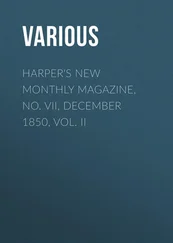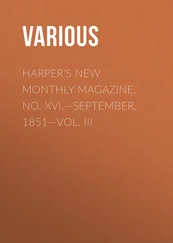Various - Harper's New Monthly Magazine, No. XXIV, May 1852, Vol. IV
Здесь есть возможность читать онлайн «Various - Harper's New Monthly Magazine, No. XXIV, May 1852, Vol. IV» — ознакомительный отрывок электронной книги совершенно бесплатно, а после прочтения отрывка купить полную версию. В некоторых случаях можно слушать аудио, скачать через торрент в формате fb2 и присутствует краткое содержание. Издательство: Иностранный паблик, Жанр: periodic, foreign_edu, на английском языке. Описание произведения, (предисловие) а так же отзывы посетителей доступны на портале библиотеки ЛибКат.
- Название:Harper's New Monthly Magazine, No. XXIV, May 1852, Vol. IV
- Автор:
- Издательство:Иностранный паблик
- Жанр:
- Год:неизвестен
- ISBN:нет данных
- Рейтинг книги:4 / 5. Голосов: 1
-
Избранное:Добавить в избранное
- Отзывы:
-
Ваша оценка:
- 80
- 1
- 2
- 3
- 4
- 5
Harper's New Monthly Magazine, No. XXIV, May 1852, Vol. IV: краткое содержание, описание и аннотация
Предлагаем к чтению аннотацию, описание, краткое содержание или предисловие (зависит от того, что написал сам автор книги «Harper's New Monthly Magazine, No. XXIV, May 1852, Vol. IV»). Если вы не нашли необходимую информацию о книге — напишите в комментариях, мы постараемся отыскать её.
Harper's New Monthly Magazine, No. XXIV, May 1852, Vol. IV — читать онлайн ознакомительный отрывок
Ниже представлен текст книги, разбитый по страницам. Система сохранения места последней прочитанной страницы, позволяет с удобством читать онлайн бесплатно книгу «Harper's New Monthly Magazine, No. XXIV, May 1852, Vol. IV», без необходимости каждый раз заново искать на чём Вы остановились. Поставьте закладку, и сможете в любой момент перейти на страницу, на которой закончили чтение.
Интервал:
Закладка:
"Then idly twirled his golden chain,
And smiling, put the question by."
Mohammad Alee, with expectant eyes fixed upon Syria, sat silent, his hand trembling with eagerness and ready to grasp the splendid prize. "The cloud-capped towers, the gorgeous palaces" of a new oriental empire rose, possible in the light of hope.
His army was carefully disciplined. The fame of its tried officers had been won upon the battle-fields of the Empire. He had a fleet and all the resources of the latest military and marine science. Over all, he had his son Ibrahim, already proved in Arabia and Greece, of a military genius peculiarly Oriental, swift and stern, rude in thought, but irresistible in action – the slave of his father's ambition, the iron right-hand of his will. Internal prosperity and external prestige sealed Mohammad Alee's hope and determination.
Against him was arrayed the worldly magnificence of the Ottoman Porte. But the bannered Muslim lance that had thundered at the gates of Constantinople, and entering, had planted itself upon the earliest Christian church, and flapped barbaric defiance at civilization, was rusty and worm-eaten. Its crimson drapery fluttering, rent, upon an idle wind, would be inevitably shivered by the first rough blow of modern steel.
And the great Powers? —
Their action was, of course, doubtful. There was a chance of opposition, a probability of interference. But the grandeur of the stroke was its safety. From the universal chaos what new combinations might not be educed!
No sooner, therefore, had the Porte "put the question by," than Mohammad Alee proceeded to answer it. The Egyptian army, headed by Ibrahim Pacha, advanced into Syria, and sat down before Acre. Cherishing the old grudge against Abdallah, the Porte, now that a decided part had been taken, smiled faintly in approval. But the conduct of the war betrayed resources of ability and means which kindled terrible suspicions. The firman came from Stamboul, commanding the Pacha of Egypt to withdraw into his own province. He declined, and was declared a rebel.
The bridge thus fell behind him, and only victory or death lay before.
For six months Ibrahim Pacha lay before Acre, and on the 27th May, 1832, he entered by bloody assault the city which Richard Cœur de Lion and Philip Augustus had conquered before him, and from which Napoleon Bonaparte had retired foiled. The Syrian war began.
The victorious army advanced, triumphing. The Syrian cities fell before it. The stream of conquest swept northward, overflowing Damascus as it passed. The war was no longer a quarrel of two Pachas, it was a question of life or death for the Turkish Empire. Vainly the Sultan's choicest generals struggled to stem the torrent. The proud walls along the Golden Horn trembled, lest their pride should be for the third time humbled, and this time, as the last, from the Asian shore.
Northern and Western Europe stared amazed at the wonderful spectacle, listening across the hushed Mediterranean to the clang of arms resounding in the effete East, as the appalled Romans heard the gusty roar of the battle of the Huns high over them, and invisible in the air.
Surely it was only the interference of the three Powers that saved the Sultan's throne. That alone deprived us of the pageant of another oriental military romance, so rapid in inception, so entire in execution, that we should have better comprehended those sudden, barbaric descents of the middle ages, which changed in a moment the political aspect of the invaded land: – in a moment, because the mighty appearance of life and power was but a mummy, which a blow would pulverize.
One man, however strong and skillful, could not withstand the force of Europe, and Mohammad Alee retired, baffled, before the leaders of the political Trinity that a few years before had dethroned Napoleon.
The crisis of his life was passed, and unfavorably for his hopes and aims. At the age of sixty-five he relinquished the struggle with Fate, and still one of the great men of a century, rich in great men, with no hope before him, and none behind – for since kingly genius is not hereditary, your divine right is a disastrous fiction – he sank slowly away into dotage.
Before the end, however, both he and his son Ibrahim showed themselves to the Europeans who had watched with such astonished interest the culmination and decay of their power. Ibrahim Pacha, with his fangs removed, shook his harmless rattle, for the last time in the world's hearing, at a dinner given him by young Englishmen, at the Reform Club in Pall Mall, and the wreck of Mohammad Alee, driveling and dozing, took a hand at whist with young Americans in a hotel at Naples.
Father and son returned to Egypt and died there. A vast mosque of alabaster, commenced by Mohammad Alee, and now finished, crowns Cairo, "the delight of the imagination." He wished to be 'buried there; but he lies without the city walls, in that suburb of tombs, upon the cracked sides of one of which a Persian poet has written – "Each crevice of this ancient edifice is a half-opened mouth, that laughs at the fleeting pomp of royal abodes."
All the winds that blow upon Cairo, laugh that mocking laughter, and in any thoughtful mood, as you listen to them and look over the city, you will mark the two alabaster minarets of Mohammad Alee's mosque, shafts of snow in the rich blue air, if you will, but yet pointing upward.
Leaning on Lebanon, and laving her beautiful feet in the sea, the superb slave he burned to possess, still dreams in the sun. We look from the tent door and see her sleeping, and the remembrance of this last, momentary interest which disturbed the slumber, reminds us that it will one day be broken. So fair is the prize, that, knowing all others desire her as ardently, no single hand feels strong enough to grasp it, and the conflict of many ambitions secures her peace.
Yet it is clear that nerve and skill could do what they have done, and so spare is the population, so imbecile the government, and so rich the soil, that a few thousand determined men could march unresisted through Syria, and possess the fair and fertile land.
BAZAARS
Christians and Saracens agree in reprobating the black hat. But the Damascenes declare open war against it. In 1432, Bertrandon de la Brocquière entered the city with a "broad beaver hat," which was incontinently knocked off his head. Naturally his first movement was "to lift my fist," but wisdom held his hand, and he desisted, content to revenge himself by the questionable inference that it was "a wicked race."
But if it be "wicked" to malign the black hat, who shall be justified?
This was only a gentle illustration of the bitter hatred of Christians and all infidels, cherished by the Damascenes, who are the most orthodox of Muslim. Indeed, it is only within twenty years that an accredited English representative could reside in Damascus, and he maintains an imposing state. At present, some hundred European tourists visit the city yearly, and the devout faithful find reasons for toleration in infidel gold, which they never found in argument.
Here, too, as every where in Syria, Ibrahim Pacha has been our ally. He permitted infidels to ride horses through the streets. "O, Allah!" exclaimed the religious Damascenes, who are termed by the Turks Shami-Shoumi , cursed rascals. "Your Highness suffers Christians to sit as high as the faithful."
"No, my friends," responded Ibrahim, "you shall ride dromedaries, which will put you much above them."
We went into the bazaars to encounter these enemies of the black hat, and ex-officio riders of dromedaries. We had a glimpse of their beauty as we entered the city. But Eastern life is delightful in detail. It is a mosaic to be closely studied.
You enter, and the murmurous silence blends pleasantly with the luminous dimness of the place. The matting overhead, torn and hanging in strips along which, gilding them in passing, the sun slides into the interior, is a heavy tapestry. The scene is a perpetual fair, not precisely like Greenwich Fair, or that of the American Institute, but such as you frequent in Arabian stories.
Читать дальшеИнтервал:
Закладка:
Похожие книги на «Harper's New Monthly Magazine, No. XXIV, May 1852, Vol. IV»
Представляем Вашему вниманию похожие книги на «Harper's New Monthly Magazine, No. XXIV, May 1852, Vol. IV» списком для выбора. Мы отобрали схожую по названию и смыслу литературу в надежде предоставить читателям больше вариантов отыскать новые, интересные, ещё непрочитанные произведения.
Обсуждение, отзывы о книге «Harper's New Monthly Magazine, No. XXIV, May 1852, Vol. IV» и просто собственные мнения читателей. Оставьте ваши комментарии, напишите, что Вы думаете о произведении, его смысле или главных героях. Укажите что конкретно понравилось, а что нет, и почему Вы так считаете.












